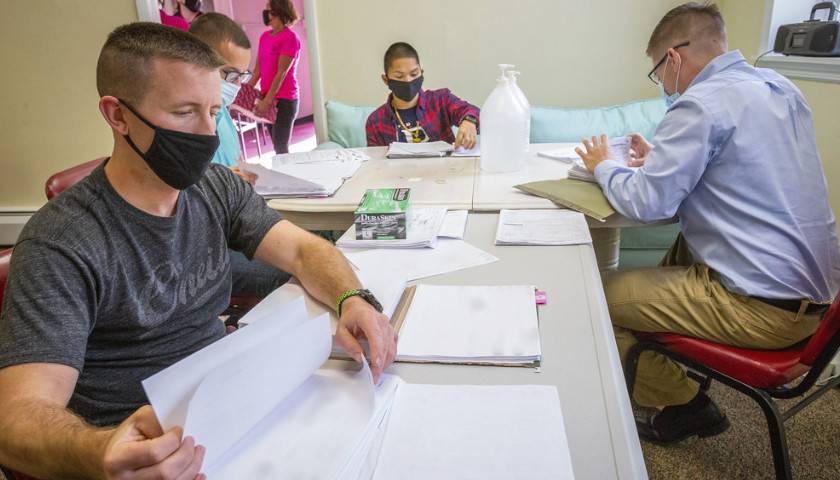by Natalia Mittelstadt
The effort to change how the United States elects its presidents – from the existing Electoral College process to a national popular vote – is gaining momentum, but critics are questioning its legality and whether it improves the country’s election system.
Sixteen states and Washington, D.C., have joined the National Popular Vote Interstate Compact, with Minnesota being the latest and Michigan and Nevada considering it.
Supporters say they don’t want to abolish the Electoral College, just change how electors are picked – by the national popular vote, not by whether the Democrat or Republican presidential nominee wins states’ popular vote.
“The National Popular Vote Interstate Compact will guarantee the presidency to the candidate who receives the most popular votes across all 50 states and the District of Columbia,” says the group, which makes clear the compact also “preserves the Electoral College.”
Late last month, Minnesota became the most recent state to join the compact, after the provision was added to an omnibus bill.
Last week, the Michigan House Elections Committee voted to send a bill to join to the full chamber.
And the Nevada legislature passed a resolution last month to amend the state constitution to join, which if approved again in two years, would be placed on the 2026 general election ballot for voters to decide on.
As a result of Minnesota joining the compact with its 10 electoral votes, the compact is only 65 electoral votes away from taking effect.
The compact says the National Popular Vote bill will take effect when enacted into law by states possessing 270 electoral votes – a majority of the total 538 electoral votes. It currently has 205 electoral votes.
The 538 votes come from the same number of electors for each presidential election, with each state getting as many electors as it has members in the U.S. House of Representatives and Senate.
Political parties in each state nominate people to be the electors for that state prior to Election Day. In 48 states, electors for the Electoral College are chosen by a “winner-take-all” system, meaning that whichever political candidate receives the most votes statewide gets all of the state’s electors.
The two states that are not “winner-take-all” are Maine and Nebraska. In both states, one elector is elected in each congressional district and the remaining two are elected based on the statewide vote, according to the group Save Our States.
Whichever candidate wins the most electoral votes – at least 270 – becomes president.
One of the biggest arguments for making such a change, the compact argues, is because so many states have the winner-take-all statutes. So presidential candidates have no reason to pay attention to the issues of concern to voters in states in which the statewide outcome is a foregone conclusion.
The compact points out that in the 2012 presidential race all 253 general-election campaign events were in just 12 states, and two-thirds were in just four states.
“Thirty-eight states were completely ignored,” the compact concludes.
Trent England, the founder of Save Our States, told Just the News on Monday that most people who support the national popular vote do so “because they see it as the easiest way to nullify the Electoral College.”
He also argues that because the compact creates a block of states, a candidate with a small plurality could end up with the majority of electoral votes, which “destroys the benefit” of the Electoral College “to small states.”
England also says the national popular vote is “clearly unconstitutional” and that courts would likely “strike it down.”
Another critic is Jasper Hendricks, executive director of Democrats for the Electoral College, and a Virginia elector for 2016 Democratic presidential nominee Hillary Clinton.
“The compact adds more potential confusion to the presidential election process” by creating “another layer for people to be able to dispute, he said.
In 2016, Clinton received nearly 2.9 million more votes than GOP nominee Donald Trump, giving her the largest popular vote margin of any losing presidential candidate. In the loss, she became the fifth presidential candidate in U.S. history to win the popular vote and lose the Electoral College, according to the Associated Press.
Hendricks also says the compact is not legally binding and that more people should be educated on the Electoral College process to foster “conversations around real reforms to the Electoral College.”
“We need to work as hard as we can to assure Americans that our process is fair and transparent, but this isn’t the way to go about it,” also said Hendricks, who acknowledged that Democrats have been pushing for the national popular vote.
National Popular Vote Chairman John Koza told Just the News on Monday the compact is “state law.”
“It is just as binding as any other state law, including current winner-take-all laws that award all of a state’s electoral votes to the candidate who gets the most votes in the state,” he said.
– – –
Natalia Mittelstadt is a reporter at Just the News. Mittelstadt graduated from Regent University with Bachelor of Arts degrees in Communication Studies and Government.




